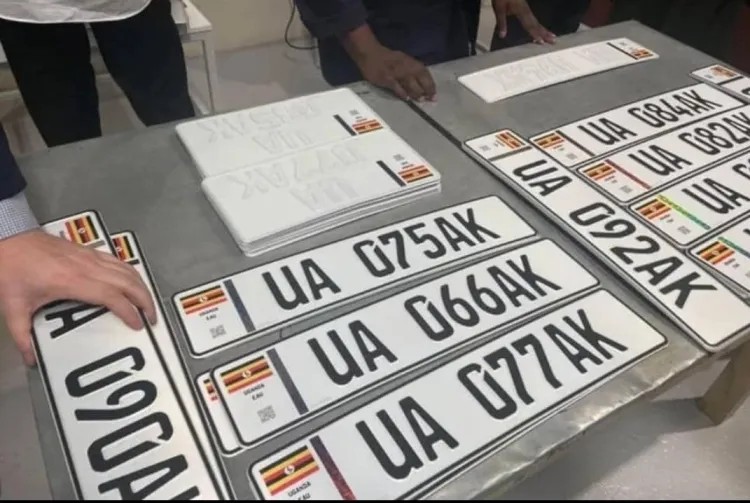KAMPALA, Uganda— The Ugandan government’s ambitious plan to enhance road security through the rollout of digital number plates has come under intense scrutiny, as reports emerge that stolen vehicles remain untraceable despite the system’s promise of real-time tracking.
The initiative, spearheaded by the Ugandan government in partnership with the Russian Joint Stock Company (JSC) Global Security, was intended to aid law enforcement in quickly identifying vehicles used in criminal activities. However, over a year since the phased rollout began, frustrated vehicle owners and security officials are questioning the effectiveness of the system, highlighting glaring gaps in its implementation.
One of the most vocal groups raising concerns is boda boda (motorcycle taxi) riders, who were among the first to have their bikes fitted with the new plates. Many have reported cases of stolen motorcycles that remain untraceable, contradicting official claims that the system would enhance vehicle security.
“We were told these plates would protect us from theft,” lamented John Ssemakula, a Kampala-based boda boda rider who lost his motorcycle last month. “I reported it to the police, but they told me they couldn’t track it. So what was the point of upgrading to these plates if they don’t work?”
Security sources within the Uganda Police Force, speaking on condition of anonymity, confirmed that there is a major disconnect between the tracking technology and law enforcement operations.
“The information simply isn’t getting to the right place,” a senior traffic officer admitted. “We have cases where vehicle details don’t update properly in the system, and sometimes, incident reports don’t even reach the monitoring center in time. There’s a big gap between what was promised and what is happening on the ground.”
At the heart of the controversy is JSC Global Security, the Russian firm awarded the 10-year contract to implement the Intelligent Transport Monitoring System (ITMS). The company, tasked with manufacturing and distributing the digital plates, is now facing allegations of incompetence and misrepresentation.
Critics, including government insiders, allege that JSC is not an actual manufacturer but a brokerage firm that imports number plates from Poland.
“They have no manufacturing capacity of their own,” an official familiar with the deal revealed. “They are simply buying and reselling plates from elsewhere. This raises serious concerns about quality control, sustainability, and whether Uganda is truly getting the technology it paid for.”
The decision to award the contract to JSC has also been criticized for sidelining Tumpeco, a Ugandan company owned by businessman Gordon Wavamunno, which previously produced the country’s number plates.
“Tumpeco had the expertise and infrastructure to make these plates locally,” another industry insider noted. “Instead, a foreign middleman with questionable capabilities was brought in. This is not only an issue of fairness but also of national economic growth. Why was a local manufacturer ignored in favor of an unproven foreign entity?”
The rollout, which began with government vehicles in November 2023 and expanded to motorcycles in November 2024, has been marred by delays and operational challenges. Motorists have reported long waiting periods before receiving their plates, as well as confusion over the payment and issuance process.
“We’ve seen people pay for their plates and wait for months without receiving them,” a vehicle owner from Wakiso complained. “The process is neither transparent nor efficient. There are too many middlemen, and no one seems to have clear answers.”
Additionally, there are growing concerns about the cost of the digital plates, which some Ugandans argue is disproportionately high.
“These plates are expensive, yet they don’t even offer real-time tracking,” said an automotive technology analyst who requested anonymity. “In other countries, digital number plates are linked to an advanced tracking network that allows authorities to pinpoint a vehicle’s exact location in case of theft or crime. But in Uganda, the system being marketed as ‘digital’ is really just a standard plate with a chip embedded in it, and that chip doesn’t provide the necessary tracking capabilities.”
One of the most alarming revelations is that the digital plates have not yet been integrated with Uganda’s network of Closed Circuit Television (CCTV) cameras, a key component that was expected to enhance security monitoring.
“Without CCTV integration, these plates lose most of their intended functionality,” a police source explained. “The system was supposed to allow automatic recognition of stolen vehicles through a centralized database connected to surveillance cameras. That hasn’t happened, and as a result, vehicle theft remains as rampant as ever.”
The growing dissatisfaction with the project has triggered calls for greater oversight and accountability. Civil society organizations and opposition figures are now urging the government to conduct a comprehensive review of the project and reassess its partnership with JSC Global Security.
“This is another example of a failed government contract that is costing taxpayers billions,” said an opposition legislator. “We need a full audit of this deal, and if necessary, the contract should be canceled in favor of a more competent and transparent approach.”
As pressure mounts, Ugandan authorities are yet to provide a clear response to the concerns raised. Meanwhile, vehicle owners across the country remain frustrated, uncertain whether the new number plates will ever fulfill their promised role in crime prevention.






















